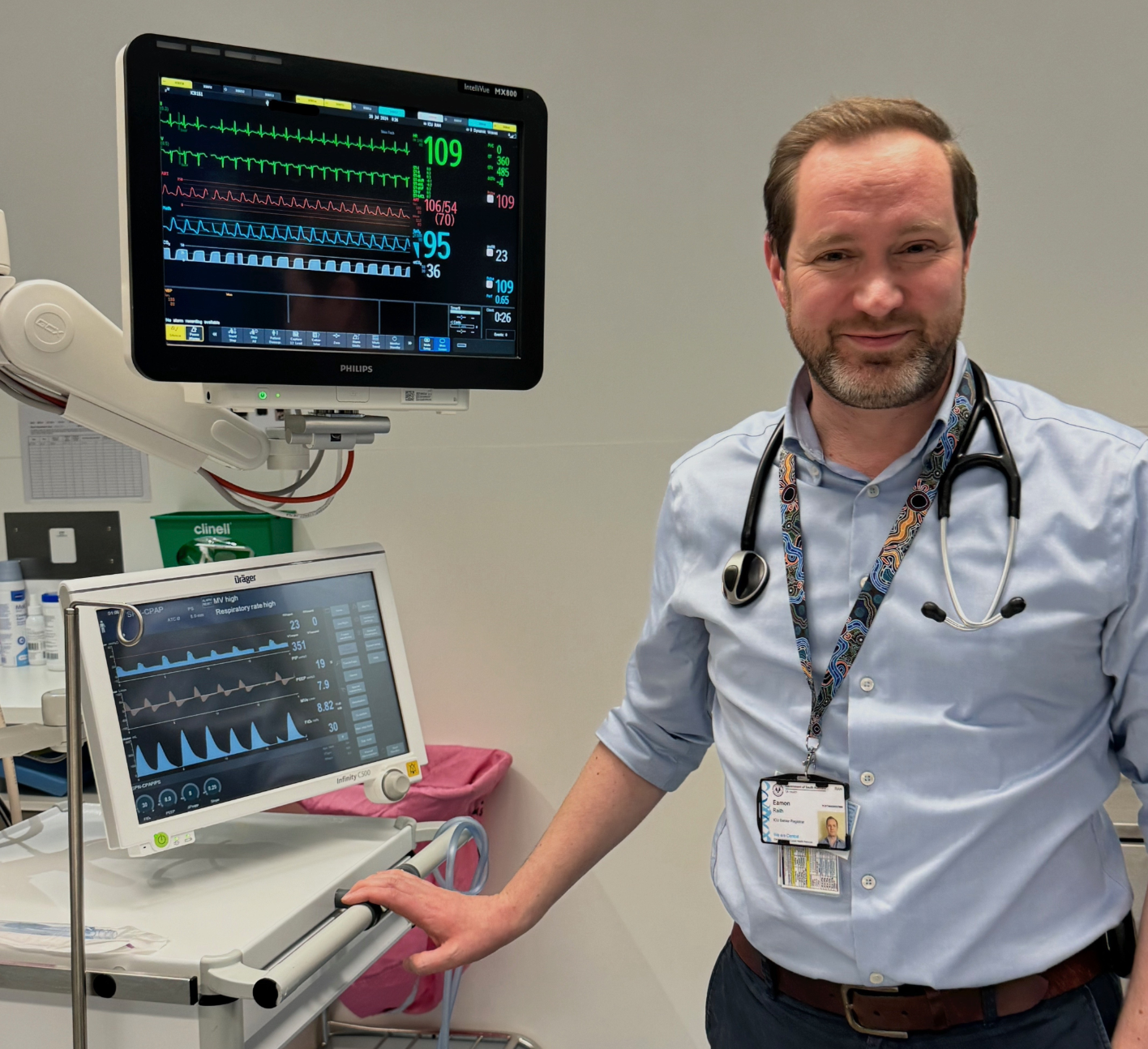CCRG’s latest Churchill Fellow embarks on neurocritical care world tour.
The Critical Care Research Group’s Associate Professor Eamon Raith has been awarded a Churchill Fellowship to explore innovative nanoscale biophotonic methods for treating critical brain injury. His research will take him to the USA, Italy, and the UK, where he will meet and collaborate with world renowned experts to advance optical technologies in neurocritical care.
A/Prof Raith, who trained in intensive care medicine in Australia and completed a fellowship in neurocritical care medicine at The National Hospital for Neurology and Neurosurgery, Queen Square, London, has more recently turned his focus to improving outcomes for patients with severe brain injuries. His research integrates pre-clinical studies, multi-omics approaches, population studies, and clinical trials, aiming to bridge global inequities in critical care.
“Recovery from severe brain injury can be compromised by additional damage caused by reduced oxygen supply to at-risk brain tissue,” A/Prof Raith explains.
“One of the biggest challenges we face is the inability to precisely monitor and predict secondary brain injuries in real-time. Current methods are reactive rather than proactive, which can lead to delays in treatment. Advancing non-invasive, real-time monitoring technologies is essential to improving outcomes and reducing long-term disability.
“TBI results from a sudden external force causing brain damage with secondary injury developing days to weeks after the initial insult. Up to 17% of TBI patients and 35% of aSAH patients die, with many survivors suffering life-changing disabilities, costing billions in lost income and increased healthcare costs.”
With the support of the Churchill Fellowship, A/Prof Raith will investigate new approaches to monitoring brain metabolism and function and translate these advancements to clinical practice with the goal to improve early detection and treatment of secondary brain injuries.
“Current monitoring devices in intensive care units are often bulky and invasive, and they may fail to detect early warning signs of secondary brain injury. Biophotonics, the study of interactions between light and biological systems, offers exciting new possibilities for early detection and intervention.”
“The Fellowship is an incredible opportunity to integrate these new techniques into different ICU settings and investigate their ability to improve the way we detect and treat brain injuries, ultimately saving lives and enhancing patient recovery.
“CCRG is already leads the world with our understanding of ways to optimise patient recovery. Our ICU of the Future project, led by CCRG Director John Fraser AO and Oystein Tronstad, has completely remodelled the ICU environment to be more recovery focused. All the research we do is aimed at ensuring patients not only SURVIVE critical illness, by THRIVE long after hospital discharge. Through the Fellowship, I hope to build on the innovative ways we approach neurological care in ICUs.”
Eamon Raith has a Master of Advanced Critical Care Practice from Monash University, a Master of Clinical Ultrasound from the University of Melbourne, and a PhD in Medicine from the University of Adelaide. He holds academic appointments at The Institute for Molecular Bioscience at University of Queensland, the Australian and New Zealand Intensive Care Research Centre at Monash University, James Cook University, The University of Adelaide and University College London. During the COVID-19 pandemic, he served as Clinical Lead for COVID-19 Response at Queen Square, London.
Eamon also serves as an expert advisor to the World Bank Pandemic Fund to enhance pandemic preparedness and response capabilities globally. His work reflects a broader commitment to improving critical care medicine and public health outcomes worldwide.
“The intersection of critical care, neuroscience, and emerging technology is where real breakthroughs can happen. I look forward to bringing the knowledge gained and collaborations former during my Fellowship back to Australia where we can continue to drive innovation that has a global impact.”
The Churchill Fellowship enables Australians to travel overseas to gain new knowledge and expertise that will benefit the country upon their return. Eamon’s research will not only advance Australia’s capabilities in neurocritical care and biophotonics but also contribute to global efforts in developing innovative, non-invasive methods for cerebral monitoring and treatment.

